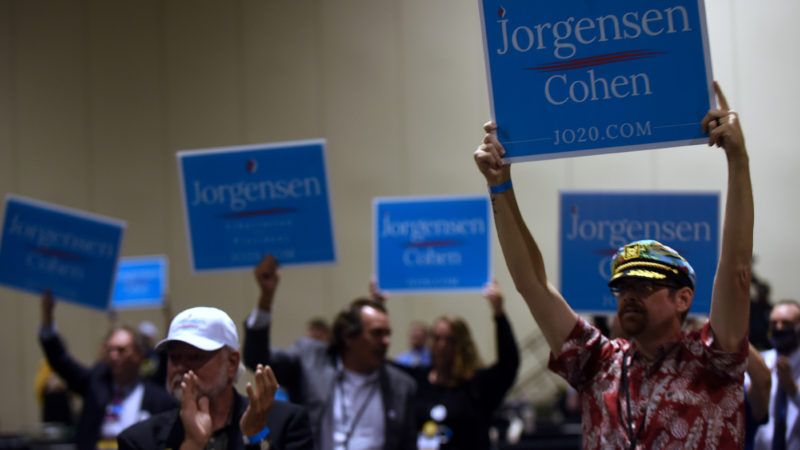Where Do Libertarians Go From Here?
Libertarians would have a more promising future if they spent less time worrying about national elections and more time working politically at the local level.

At a Libertarian convention years ago, one of the party's candidates started saying, "When I'm president of the United States." I chuckled and responded: "Well, that isn't going to happen." We all knew then—and know now—that the Libertarian Party (L.P.) candidate has zero chance of ever sitting behind the Resolute Desk.
After former New Mexico Gov. Gary Johnson won the L.P. nomination in 2016, libertarian activists thought it was their year to put the party on the map. Well, that was the view of those who weren't mad about Johnson's lack of ideological purity and his not-particularly-libertarian running mate, former Republican Bill Weld.
At the time, some optimism seemed warranted. The race pitted an enormously unpopular Democratic candidate against a vulgar Republican one, which—in theory, anyway—should have created a hunger for an experienced ticket offering sensible limited-government solutions.
After the ticket garnered 3.27 percent of the vote, I received a press release celebrating that accomplishment, which was a record-setting vote haul for the Libertarian Party. That was perhaps 47 percent and 270 electors short of making any difference, but such are the small victories that keep libertarians going. I remember when state party leaders celebrated their elected officials, with a member of a water board leading the show.
After Tuesday's vote, Libertarian Party nominee Jo Jorgensen drew around 1 percent of the vote. It has nothing to do with her personality, which is pleasant, or her campaign, which seemed fine. This year's election was a referendum on Donald Trump. The major parties have convinced the nation that this was the Most Important Election Ever—and the wrong outcome would lead America into (pick one) socialism or fascism. Why "waste" a vote?
My goal isn't to dump on the L.P., even though it wouldn't take much research to chronicle its long-running failures. The two major parties dominate the national discussion. They have put impediments in the way of third-party ballot and debate access. Although libertarianism has deep roots within the nation's history, most Americans are not libertarians. That makes party building a tough row to hoe.
Democrats and Republicans have evolved largely into warring cultural tribes rather than vessels of ideological consistency. As government grows and both parties fight over who controls the levers of power, it's harder to stay relevant with our less-is-more approach toward governance. It's difficult even to get our policy ideas onto the national stage.
To make matters worse, libertarians have irreconcilable disagreements. Many libertarian colleagues despise the president and view him as a wannabe authoritarian, while others are convinced that he's the most libertarian president in ages. In 2014, Jeffrey Tucker wrote about two main libertarian camps, which he termed "humanitarians" and "brutalists."
The humanitarians believe in liberty because it "allows peaceful human cooperation" and "keeps violence at bay," he argued. "It allows for capital formation and prosperity. It protects human rights of all against invasion. It allows human associations of all sorts to flourish on their own terms."
By contrast, brutalists like liberty because "it allows people to assert their individual preferences, to form homogeneous tribes, to work out their biases in action, to ostracize people based on 'politically incorrect' standards." It allows them "to hate to their heart's content so long as no violence is used as a means, to shout down people based on their demographics or political opinions." I call them "get off my lawn" libertarians.
I count myself among the humanitarians, but my point is the chasm between these self-identified libertarian groups is as deep as the one separating progressive Democrats from nationalist conservatives. It's hard to build a national movement that resonates with the public when our own movement is bitterly divided.
The Orange County Register recently interviewed Jorgensen and came away impressed. In a pre-election editorial, the newspaper argued that she "deserves to be heard." While her overall ideas were worthy of discussion, she had nothing illuminating to say in response to my question about how we, as libertarians, should proceed in our increasingly non-libertarian world.
I've long argued that libertarians should focus their politicking on the local level, at building a bottom-up rather than top-down movement. California's city council and supervisor races are nonpartisan, which gives third-party candidates real opportunities to actually win office. We shouldn't underestimate how much we can achieve at that level.
For instance, former Calimesa Mayor Jeff Hewitt, now a Riverside County supervisor, led the reform of his city's fire department to reduce pension liabilities—something officials in the Orange County city of Placentia officials echoed. The legislature then passed a law halting such reforms out of fear that it would spread (and endanger union pay packages), but this was a testament to how much change one elected libertarian can accomplish.
A libertarian has again failed to become president or to even seriously be in the running. Perhaps libertarians have a more promising future if we spend less time worrying about national elections and more time championing our good ideas—and working politically at the local level.
This column was first published in The Orange County Register.


Show Comments (233)